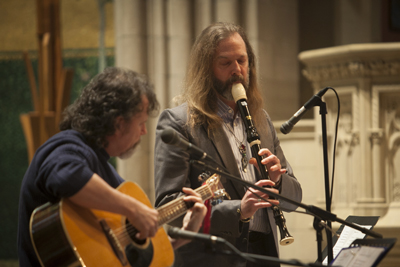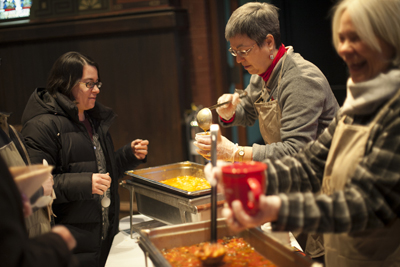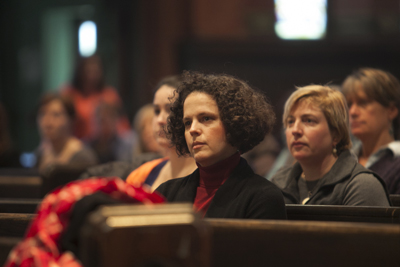Hope is action and community, Miller says at Soup and Hope
By Nancy Doolittle



Drawing from his Quaker background, his early work in a rural African village and his leadership roles at numerous educational institutions, A.T. Miller opened the first program of the 2013 Soup and Hope series with song, poetry and personal narrative to convey his reflections on hope.
"Hope is not the well, / It is the digging of it," he began, reading a poem he had recently written. "The dawning sun comes from the dream, / And hope is when we rise from the bed -- / Acting on a dream -- / Sharing it to make it real...."
Cornell's associate vice provost for academic diversity, Miller admitted he is an idealist. "The hope that speaks most to me, and that has inspired me through my life, is the hope of idealism, the vision of the beloved community, the idea of true justice, the possibility that the world can and must be made right," he said.
Although he knows he cannot make his ideals a reality, Miller said, he can work with others to advance them. "If you work just for yourself or your career, that dies with you, but when you are engaged with others in broader objectives, the ongoing struggle, your contribution is part of a mighty stream that carries forward -- a stream of dedication and love and meaning, of comrades and companions," he said.
The celebrations of the Martin Luther King holiday, for instance, are not just about remembering King, but about continuing the work that King began and keeping that hope alive, Miller said.
Miller's work with a Quaker lobby group in Washington, D.C., provides him with another tenet of his idealism: hope is not words, but actions. "Let your life speak," he said, quoting the Quaker aphorism.
Education is a "field of hope," Miller said, because it actively invests in coming generations. "Real hope is demonstrated when we act, when we do, when we invest," he said.
Miller saw hope in action when he worked in Shikokho, a rural village in western Kenya. The village wanted a school but did not have the funds to build one. So they dug a hole for the foundation and each day every one of the school's 75 children would bring a stone to school. By the end of a couple of years, they had rocks enough to build that school.
Later, they needed a science laboratory -- something far beyond their means. Yet they went ahead with planning and contributing as they could. Having heard about the school, the president of Kenya decided to visit it and to fund their lab. "There is a mutuality to hope," Miller said. "In significant ways, we hope each other into being."
Hope as action, as mutuality -- as the belief that while we may not attain the ideal, we may move ourselves and others closer to it -- is summed up, for Miller, in a quote from Quaker (and Pennsylvania founder) William Penn: "Let us then try what love can do to mend a broken world." Miller and his husband, Craig Kukuk, who comprise the folk duo Bridgewater, closed the event with an original song Miller had written based on those words.
Media Contact
Get Cornell news delivered right to your inbox.
Subscribe